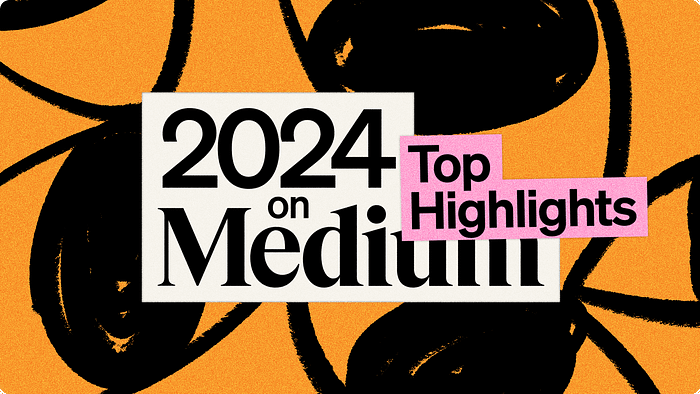
The most-highlighted sentences of 2024
🙏 The highlight of my year? Working on this newsletter. Thank you to the hundreds of thousands of you who open and read this each week!
Issue #234: highlights, year-end book lists, and deliberate distraction
As the calendar year wraps up, we’re doing the same here at the Medium Newsletter. This week, we’ll be taking a look back at the year on Medium, pulling out the top highlighted passages (today), calling out some of the most-read responses, flagging notable new publications, writers new to Medium, and (Friday) sharing the most-read and most-shared stories of the year. Then we’re taking a break for the last week of 2024 — we hope you will as well, we all need rest — and will be back in 2025 to help you better understand your world in the new year.
Reading through the most-highlighted passages from the year, a few clear themes stood out. By far the biggest one — and not a surprise if you’re a regular reader of this newsletter, as we highlighted a number of these in past issues — are ideas related to deepening your understanding of yourself:
“When it comes to writing online, ‘how I’ beats ‘how to.’”
— , Why I shifted from pure writing to documenting instead
“People with high levels of trait self-control are good at avoiding temptation — not resisting it.”
— , The secret life of people with high self-control (it’s easier than you think)
“Showing up. Showing up with your whole self, showing up with your values and beliefs, showing up with what makes you unique, but above all — showing up with consistency.”
— , Just show up
“There’s a fine line between taking on a worthwhile challenge, and taking on unnecessary stress.”
“The problem with good habits, in other words, is that they sacrifice intentionality for efficiency.”
“Edison did not look for problems in need of solutions; he looked for solutions in need of modification.”
— , quoting the New Yorker in MVP is over. You need to think about MVE.
Of course, the flip side of this showed up here, too — there was also a lot of wisdom about better understanding other people:
“If a person’s behavior doesn’t make sense to you, it is because you are missing a part of their context.”
“The value of research doesn’t come from elevating people who are already shouting. It comes from finding the people who are not being heard, and adding their voices to the conversation.”
— , Nike’s $25B blunder shows us the limits of ‘data-driven’
“Honesty is direct, whereas dishonesty tends to be indirect.”
— , I’m an (actual) detective: Here are 7 signs that someone is lying to you
Lastly: While we’re avowedly pro-human-writing here at Medium, we also know AI tools can serve many purposes, like helping you learn new skills. And two of the most-highlighted passages this year were AI prompts that will raise your skill level in using chat-based AI tools like ChatGPT. We think you’ll find them useful:
Before you start, please ask me any questions you have about this so I can give you more context. Be extremely comprehensive.
— , The most important ChatGPT prompt
Create a curated list of use cases for ChatGPT, each thoughtfully designed to align with my occupation. This list will serve as my personalized guide, enabling me to leverage ChatGPT’s capabilities in various aspects of my occupation. Organize this list into 10 distinct sections sorted by their relevance to my occupation. In each section, construct a table with columns for “Use Case” and “Example Request”. Each section will contain 5 use cases examples. The “Example Request” will be written in the form of a direct request to ChatGPT. Begin by asking me about my occupation, and based on it fill in the interests, goals, challenges I’m facing. It’s imperative that you follow the request for 10 sections and 5 use case examples in each section.
— , This one prompt will teach you how to use ChatGPT
—
What else we’re reading
- I’ve never thought of it this way, but year-end book lists tend to be misleading for very mechanical reasons: Unlike music, TV, and movies, books take a long time to read, meaning critics can only read a tiny fraction of what gets published every year. ()
- The best thing I learned from this story about a chef’s time working at a Michelin-starred restaurant was how the culinary team — the folks making the food — are also the servers, hosts, and dishwashers. They see the whole experience, so they know how to make it better. ()
- The deputy campaign manager for Kamala Harris sees her loss as a symptom of a larger issue for Democrats: The institutions they’re used to influencing — traditional media and Hollywood — are no longer the dominant cultural forces. “You don’t get a national eight-point shift to the right without losing hold of culture.” (Semafor)
⚡️ Your daily dose of practical wisdom about inspiration
To find creative inspiration, practice “deliberate distraction.” Put yourself in the path of serendipity with an aimless diversion, like flipping through old encyclopedias or browsing the shelves of a bookstore without a goal in mind, and see what unexpected connections your mind starts to make.
Deepen your understanding every day with the Medium Newsletter. Sign up here.
Edited and produced by &
Questions, feedback, or story suggestions? Email us: tips@medium.com
Like what you see in this newsletter but not already a Medium member? Read without limits or ads, fund great writers, and join a community that believes in human storytelling.

